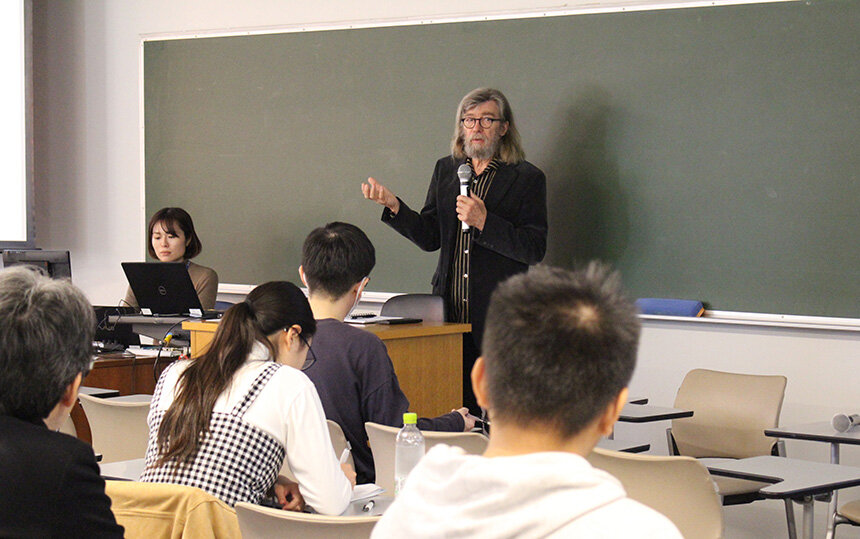NEWS
Lecture by Dr. Tom Erik Arnkil on "Invitation to Early Dialogues: Co-generating Dialogical Spaces in a University Context" was Held
Update: March 11, 2025

On November 29, 2024, the lecture "Invitation to Early Dialogues: Co-generating Dialogical Spaces in a University Context" by Dr. Tom Erik Arnkil was held in the Science Hall at ICU. This lecture was hosted by Robert Eskildsen, Vice President for Academic Affairs and co-hosted by the ICU Human Rights Committee. The purpose of the lecture was to explore the benefits of engaging in dialogues and to learn how to create "dialogical spaces" that make dialogues more effective. At ICU, "dialogue" is the heart of learning in liberal arts education.
The event was moderated by Robert Eskildsen, Vice President for Academic Affairs, and around 40 students, and faculty / staff members attended in person.
Dr. Tom Erik Arnkil's studies have focused on developing dialogical methods, and he played a central role in developing the Early Dialogue and Anticipation Dialogue methods. This time, he talked about early dialogue and the key points for generating dialogical spaces.
At the beginning of the lecture, Vice President for Academic Affairs Eskildsen introduced Dr. Arnkil and talked how he encountered method of open dialogue, early dialogue, and Dr. Arnkil himself.
The lecture by Dr. Arnkil began with an introduction to the concept of "Early Dialogue". It focuses not on directly intervening in problems but on having early dialogues that address one's own worries. Dr. Arnkil stated that dialogue is something people engage in from birth. He also mentioned that everyone has unique perspectives formed through experiences and relationships, and that dialogue requires respecting the unique "otherness" of people that result from these experiences and relationships.
The lecture then moved on to how to create dialogical spaces. Dr. Arnkil introduced some ways to create dialogical spaces, such as keeping an appropriate place for dialogue, understanding each other before dialogue, and understanding the distinctions between dialogue, decision-making, and debates.
The lecture included multiple opportunities for discussion. Dr. Arnkil asked, "Have you ever hesitated to bring up a worry with another person? What kind of worry, and what makes you hesitate?" Many experiences were shared by members of the audience.
Dr. Arnkil pointed out that people hesitate to express their concerns because they anticipate that their actions might harm their relationships. However, he noted that even in such situations, early dialogue can help find solutions together and enable early resolution. He introduced effective methods such as avoiding blaming others, not trying to change the person but rather asking for help, and keeping the practice of dialogue.
In the final question and answer period, there was a question, "What is the difference between engaging in dialogue and having sympathy for others?" In response, Dr. Arnkil explained that sympathy involves feeling pity for someone, while empathy involves understanding and sharing the feelings of another person. He stated that both empathy and sympathy are important in dialogues. Finally, he reiterated the importance of recognizing that everyone has their own unique perspectives and experiences, and respecting others' unique "otherness" in dialogue.
The following comments were made by the participating students:
- It was eye-opening to learn that understanding the basis of an opinion by asking about the other's experiences can prevent dialogue from turning into debate. The next day, this helped me have a successful dialogue with someone close to me.
- This lecture clearly defined what dialogue is and how it differs from debate, providing concrete and useful hints for making discussions, especially in ICU's debate-centered classes, more dialogical and productive.
This lecture deepened our understanding of dialogue and how to create dialogical spaces, which is at the heart of learning in liberal arts education at ICU. It was very informative for those involved in ICU who often have opportunities for discussions.
